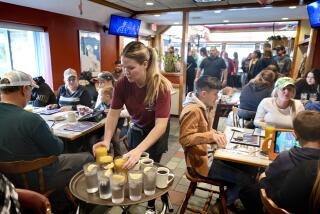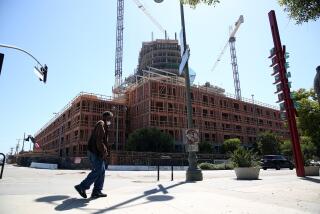Factory Output and Housing Fall in March : Economy: Despite the gloomy data, analysts see a ray of hope in the rise in building permits.
Americans got a double dose of disappointing economic news Tuesday as the government reported that both industrial production and new-home building slowed last month.
But analysts were hopeful that a rise in building permits indicated a brighter outlook to come for the nation’s beleaguered economy.
Construction of new housing fell 9.3% in March, the Commerce Department said, as builders erected homes and apartments at a seasonally adjusted annual rate of 901,000 units. That was down from 993,000 starts in February, when new-home building jumped 17.2% and briefly fueled hopes that lower mortgage rates would quickly spur a housing recovery.
A separate economic report from the Federal Reserve showed the nation’s industrial production dropping 0.3%, mostly because output of big ticket items such as appliances, furniture and other home furnishings remained depressed. It was the sixth monthly decline in a row and the longest string of declines since 10 months between March and December in 1982.
Analysts said the data indicates that the United States has yet to emerge from a recession that has been fueled by unemployment and a sluggish real estate market, as well as the uncertainty created by the short-lived war in the Persian Gulf.
“I don’t think anybody believes that we are out of the doldrums nationally,” said Neil F. Dimick, national director of real estate for the accounting firm Deloitte & Touche. “Mortgage rates haven’t gone down all that much, unemployment is still a problem. . . . There are a number of economic indicators that give me pause.”
Dimick and other analysts, however, said the 2.4% rise in applications for building permits in March could mean that the more than yearlong housing slump is coming to an end. Building permits are often a barometer of future construction activity.
“I think we’ve hit bottom,” said Kenneth Rosen, chairman of the center for real estate and urban economics at UC Berkeley. “Certainly the first half of 1991 will be better than the second half of 1990.”
Although the March figures did not heighten concern among most economists and analysts, it came as the threat of a nationwide rail strike loomed and spurred some renewed calls for the Federal Reserve to cut interest rates to stimulate business activity.
“I think the economy needs it desperately,” Sen. Alfonse M. D’Amato (R-N.Y.) told Federal Reserve Board Chairman Alan Greenspan at a Senate Banking Committee hearing, urging him to cut the interest rate at which banks can borrow money from the Federal Reserve.
Economists say lower rates spur borrowing by businesses and consumers, giving a lift to the economy and typically boosting stock and bond prices.
THE ECONOMY
Housing starts fell, and industrial production dropped for the sixth month straight. THE CHANGES Housing starts: Down Building permists: UP Industrial output: Down WHAT DOES IT MEAN? Recession: Economists were cheered by the second monthly increase in building permits, but still see the economy in a slump. Interest Rates: Pressure renewed for the Federal reserve to cut rates.
Source: Commerce Department, Federal Reserve
More to Read
Inside the business of entertainment
The Wide Shot brings you news, analysis and insights on everything from streaming wars to production — and what it all means for the future.
You may occasionally receive promotional content from the Los Angeles Times.










